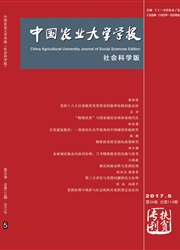

 中文摘要:
中文摘要:
结合当前我国社会阶层急剧分化的现实,利用2010年的CGSS调查数据,采用有序概率模型分析家庭绝对收入水平、家庭相对经济等级、社会阶层及其变化等变量对居民幸福感的影响。结果表明:家庭人均收入与幸福感呈显著的倒U型关系;自评的家庭经济等级对幸福感有较强的正向作用;社会阶层及其变化感知也有显著的幸福效应,处于上升社会阶层或较高社会阶层的人群更幸福。比较而言,家庭人均收入、家庭经济等级和社会阶层的幸福边际效应依次减弱,而且有明显的城乡差异。
 英文摘要:
英文摘要:
Using the data of CGSS2010 and the ordered probit model,this paper studies the effects of family absolute income level,family relative financial level and social class and its change on well-being of residents,with an eye to the current reality of China's rapid social class differentiation. The empirical results show that there is a significantly inverted ushaped relationship between the household incomes per capita and well-being. Self-evaluation of family financial level has a strong positive effect on happiness. Social class and its change have a significant effect happiness. People in a rising social class or higher social class are more happiness. By contrast,the happiness marginal effects of above three variables are progressively smaller,and have some obvious differences between urban and rural residents.
 同期刊论文项目
同期刊论文项目
 同项目期刊论文
同项目期刊论文
 期刊信息
期刊信息
